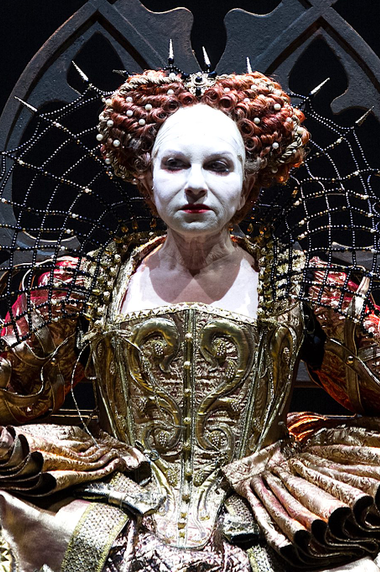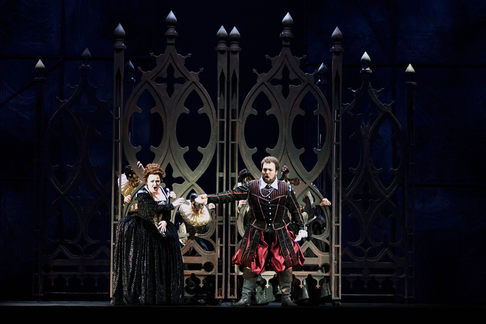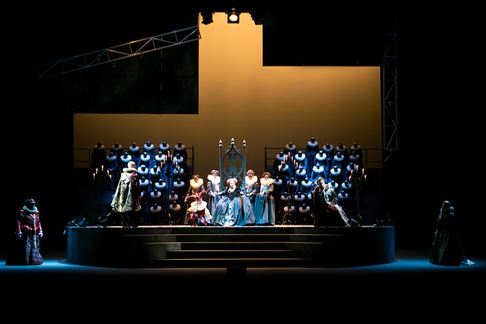Recently in Reviews
English Touring Opera are delighted to announce a season of lyric monodramas to tour nationally from October to December. The season features music for solo singer and piano by Argento, Britten, Tippett and Shostakovich with a bold and inventive approach to making opera during social distancing.
This tenth of ten Live from London concerts was in fact a recorded live performance from California. It was no less enjoyable for that, and it was also uplifting to learn that this wasn’t in fact the ‘last’ LfL event that we will be able to enjoy, courtesy of VOCES8 and their fellow vocal ensembles (more below …).
Ever since Wigmore Hall announced their superb series of autumn concerts, all streamed live and available free of charge, I’d been looking forward to this song recital by Ian Bostridge and Imogen Cooper.
The Sixteen continues its exploration of Henry Purcell’s Welcome Songs for Charles II. As with Robert King’s pioneering Purcell series begun over thirty years ago for Hyperion, Harry Christophers is recording two Welcome Songs per disc.
Although Stile Antico’s programme article for their Live from London recital introduced their selection from the many treasures of the English Renaissance in the context of the theological debates and upheavals of the Tudor and Elizabethan years, their performance was more evocative of private chamber music than of public liturgy.
In February this year, Albanian soprano Ermonela Jaho made a highly lauded debut recital at Wigmore Hall - a concert which both celebrated Opera Rara’s 50th anniversary and honoured the career of the Italian soprano Rosina Storchio (1872-1945), the star of verismo who created the title roles in Leoncavallo’s La bohème and Zazà, Mascagni’s Lodoletta and Puccini’s Madama Butterfly.
Evidently, face masks don’t stifle appreciative “Bravo!”s. And, reducing audience numbers doesn’t lower the volume of such acclamations. For, the audience at Wigmore Hall gave soprano Elizabeth Llewellyn and pianist Simon Lepper a greatly deserved warm reception and hearty response following this lunchtime recital of late-Romantic song.
Collapsology. Or, perhaps we should use the French word ‘Collapsologie’ because this is a transdisciplinary idea pretty much advocated by a series of French theorists - and apparently, mostly French theorists. It in essence focuses on the imminent collapse of modern society and all its layers - a series of escalating crises on a global scale: environmental, economic, geopolitical, governmental; the list is extensive.
For this week’s Live from London vocal recital we moved from the home of VOCES8, St Anne and St Agnes in the City of London, to Kings Place, where The Sixteen - who have been associate artists at the venue for some time - presented a programme of music and words bound together by the theme of ‘reflection’.
'Such is your divine Disposation that both you excellently understand, and royally entertaine the Exercise of Musicke.’
Amongst an avalanche of new Mahler recordings appearing at the moment (Das Lied von der Erde seems to be the most favoured, with three) this 1991 Mahler Second from the 2nd Kassel MahlerFest is one of the more interesting releases.
‘And there was war in heaven: Michael and his angels fought against the dragon; and the dragon fought and his angels, And prevailed not; neither was their place found any more in heaven … that old serpent … Satan, which deceiveth the whole world: he was cast out into the earth, and his angels were cast out with him.’
If there is one myth, it seems believed by some people today, that probably needs shattering it is that post-war recordings or performances of Wagner operas were always of exceptional quality. This 1949 Hamburg Tristan und Isolde is one of those recordings - though quite who is to blame for its many problems takes quite some unearthing.
There was never any doubt that the fifth of the twelve Met Stars Live in Concert broadcasts was going to be a palpably intense and vivid event, as well as a musically stunning and theatrically enervating experience.
‘Love’ was the theme for this Live from London performance by Apollo5. Given the complexity and diversity of that human emotion, and Apollo5’s reputation for versatility and diverse repertoire, ranging from Renaissance choral music to jazz, from contemporary classical works to popular song, it was no surprise that their programme spanned 500 years and several musical styles.
The Academy of St Martin in the Fields have titled their autumn series of eight concerts - which are taking place at 5pm and 7.30pm on two Saturdays each month at their home venue in Trafalgar Square, and being filmed for streaming the following Thursday - ‘re:connect’.
The London Symphony Orchestra opened their Autumn 2020 season with a homage to Oliver Knussen, who died at the age of 66 in July 2018. The programme traced a national musical lineage through the twentieth century, from Britten to Knussen, on to Mark-Anthony Turnage, and entwining the LSO and Rattle too.
With the Live from London digital vocal festival entering the second half of the series, the festival’s host, VOCES8, returned to their home at St Annes and St Agnes in the City of London to present a sequence of ‘Choral Dances’ - vocal music inspired by dance, embracing diverse genres from the Renaissance madrigal to swing jazz.
Just a few unison string wriggles from the opening of Mozart’s overture to Le nozze di Figaro are enough to make any opera-lover perch on the edge of their seat, in excited anticipation of the drama in music to come, so there could be no other curtain-raiser for this Gala Concert at the Royal Opera House, the latest instalment from ‘their House’ to ‘our houses’.
"Before the ending of the day, creator of all things, we pray that, with your accustomed mercy, you may watch over us."
Reviews

02 Apr 2016
Roberto Devereux in Genova
Radvanovsky in New York, Devia in Genoa — Donizetti queens are indeed in the news! Just now in Genoa Mariella Devia was the Elizabeth I for her beloved Roberto Devereux in a new trilogy of Donizetti queens (Maria Stuarda and Anne Bolena) directed by baritone Alfonso Antoniozzi.
The productions are said to be shared with Venice's La Fenice and Parma's Teatro Regio. Unknown, at least unannounced is if these additional cities will have the splendid Elizabeth of now 68 year old Mariella Devia.
This incomparable diva sang Liu in Genova at age 64, followed the next year by her debut as Norma in Bologna. Her first Roberto Devereaux Elizabeth occurred in 2014 at Carnegie Hall, a performance that is nearly legendary.
Donizetti begins his opera by exposing the abilities and vulnerabilities of his queen as she threatens a terrible vengeance upon her rival for young Devereux's love in the vocally daunting "A te svelai tutto il mio core." Donizetti ends his opera with the emotionally exhausted old queen wreaking her vengeance in "Alma rea! Spietato core!" Finally, at her greatest anguish she abandons her throne to enter her tomb on a sustained high C. You knew it was coming, you gripped your arm rests, and with this great queen you triumphed. Well, maybe the C was a bit truncated. But it was powerful and real.
Mariella Devia's voice is not ripe, nor is it warm. It is steely and technically sure, and fully subject to the mature musical intellect of a formidable stylist and, yes, it is the voice of a queen. These attributes determined the tenor of the performance. However it remained an opera about an over-aged singer more than an opera about an older queen inappropriately in love with a much younger man. But make no mistake, it was splendid way to spend a bel canto evening.
 Sonia Ganassi as Sara, Stefan Pop as Roberto Devereux
Sonia Ganassi as Sara, Stefan Pop as Roberto Devereux
Elizabeth's rival is Sara, to whom she has confided her love of the traitor, Robert Devereux. Young Sara also loves Devereux and he loves her though Elizabeth has forced Sara to marry Nottingham who is Devereux's best friend. You see that there is a lot to sing about. Sara was sung by esteemed lyric mezzo Sonia Ganassi, like la Devia a highly accomplished mature artist. The condemned Devereux was sung by Romanian tenor Stefan Pop who mostly confused singing with shouting, though he did offer a soft, sensitive and very beautiful "Ed ancor la tremenda porta non si dischiude?" Nottingham was sung by Korean baritone Mansoo Kim whose well applauded performance exhibited mastery of Italian style and technique in a beautiful, wooden, darkly colored tone.
 Principals on stage, Cecil and Gualtiero far left and far right in skirts
Principals on stage, Cecil and Gualtiero far left and far right in skirts
Cecil and Gualtiero are characters in the opera who facilitate some dreadful circumstances. They were confusing presences because they wore grand skirts but sang in baritonal voices. A primer on court dress of the 1600's would have been helpful so we could have understood and maybe appreciated the self conscious exaggerations of the costumes, victims of intensely colored synthetic fabrics, outsized and distorted collar shapes, and naive gender bending. The men of the chorus were costumed in dresses as well.
The stage was minimal, only a platform on which the principals did their thing aided by six mime assistants (the chorus costumed in all black was deployed on the floor around the stage). A huge bird cage descended to be the prison in which Roberto sang his lament (bel canto like a bird singing [groan]). There were two trendy crooked trusses alluding to, surely wishing to reinforce the fact that the agonies were, after all, only theater to be lighted.
Stage director Alfonso Antoniozzi provided lots of swish. To the accompaniment of the overture's play on “God Save the Queen” Antoniozzi dressed his queen in a huge golden imperial mantle that she would prosaically divest in the final scene, ninja acolytes raising the train to reveal a map of Europe. A singer himself Antoniozzi does in fact understand how to stage arias and numbers knowing that we do not need a lot of meaningless action to get us through ten or twenty minutes of powerful music.
The pit was in the hands of young Italian conductor Francesco Lancillotto who could not find the breath and phrase of Donizetti's bel canto, nor a solid, expressive ground for his accompaniments.
Michael Milenski
Casts and production information:
Queen Elisabetta I: Mariella Devia; Sara: Sonia Ganassi; Roberto Devereux: Stefan Pop; Nottingham: Mansoo Kim; Lord Cecil: Alessandro Fantoni; Gualtiero Raleigh: Claudio Ottino; A page: Matteo Armanino; Nottingham’s friend: Loris Purpura. Orchestra and Chorus of the Teatro Carlo Felice. Conductor: Francesco Lanzillotta; Stage Director: Alfonso Antoniozzi; Scenery: Monica Manganelli; Costumes: Gianluca Falaschi; Lighting: Luciano Novelli. Teatro Carlo Felice, Genova, March 24, 2016.


